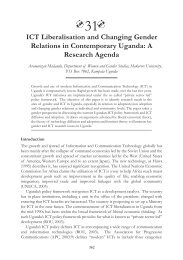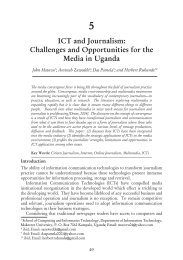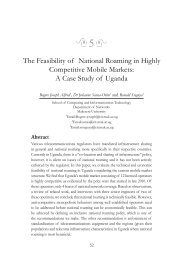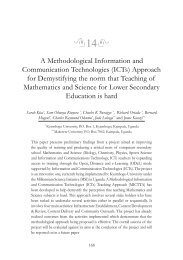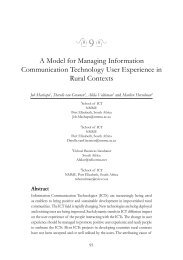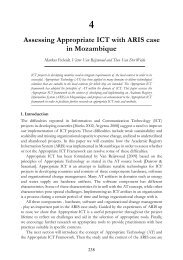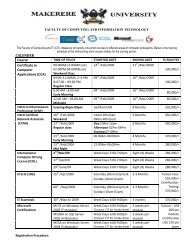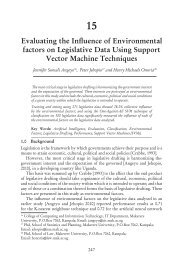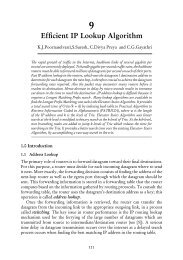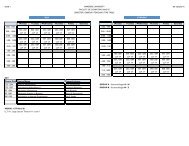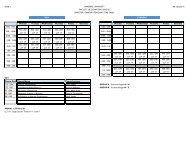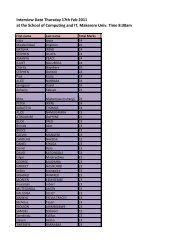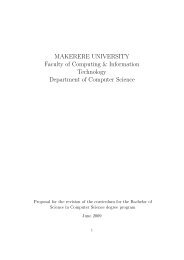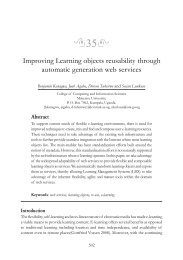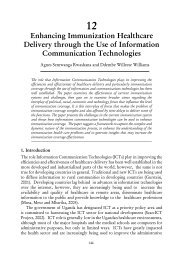Undergraduate Handbook - School of Computing and Informatics ...
Undergraduate Handbook - School of Computing and Informatics ...
Undergraduate Handbook - School of Computing and Informatics ...
You also want an ePaper? Increase the reach of your titles
YUMPU automatically turns print PDFs into web optimized ePapers that Google loves.
Reference Books:<br />
i. R. J. Anderson: Security Engineering: A Guide to Building Dependable Distributed Systems, Willey 2001.<br />
ii. R. C. Seacord: Secure Coding in C <strong>and</strong> C++, Addison Wesley, 2005.<br />
BIT 3200 Business Intelligence <strong>and</strong> Data Warehousing (4 CU)<br />
Course Description: This course covers techniques <strong>and</strong> s<strong>of</strong>tware tools that can assist management that deals with<br />
large amounts <strong>of</strong> data in management <strong>and</strong> business decision making. The course covers the fundamental differences<br />
between databases <strong>and</strong> data warehouses, the techniques <strong>of</strong> developing data warehouses as well as manipulating them<br />
to generate business strategic decisions. Students will be able to underst<strong>and</strong> the role <strong>and</strong> operation <strong>of</strong> data<br />
warehouses, be equipped with skills <strong>of</strong> developing, maintaining, <strong>and</strong> manipulating data warehouses to generate<br />
information for business decision making.<br />
Indicative Content: Data warehouse concepts: partitioning, granularity, record <strong>of</strong> source, <strong>and</strong> metadata; Building<br />
viable decision support environments; Architect development, Data migration <strong>and</strong> integration, Use <strong>of</strong> operational<br />
data stores, <strong>and</strong> transactional systems.<br />
Reference Books:<br />
i. P. Ponniah, Data warehousing fundamentals, Wiley, 2001.<br />
BSE 3202: Distributed Systems Development (4 CU)<br />
Course Content: This course gives students theoretical <strong>and</strong> practical skills on development <strong>of</strong> distributed systems<br />
<strong>and</strong> applications. This includes distributed system-specific challenges like reliability <strong>and</strong> robustness. Students will<br />
be equipped with skills <strong>of</strong> developing distributed systems.<br />
Indicative Content; Event-driven s<strong>of</strong>tware architectures, Distributed object computing, Development,<br />
documentation <strong>and</strong> testing <strong>of</strong> distributed applications, Techniques for reusable, extensible <strong>and</strong> efficient s<strong>of</strong>tware<br />
systems, Maintainability <strong>and</strong> concurrence in distributed systems, Abstraction based on patterns <strong>and</strong> object-oriented<br />
techniques<br />
Reference Books:<br />
i. S. Tanenbaum <strong>and</strong> M. V. Steen, Distributed Systems: Principles <strong>and</strong> Paradigms, 2nd Edition, Prentice<br />
Hall, 2006.<br />
ii. R. Anderson, Security Engineering: A Guide to Building Dependable Distributed Systems, John Wiley &<br />
Sons, 2001.<br />
6.4 Diploma in Computer Science <strong>and</strong> Information Technology Programme (DSCIT)<br />
6.4.1 Overview<br />
The Faculty <strong>of</strong> <strong>Computing</strong> <strong>and</strong> <strong>Informatics</strong> Technology, Makerere University runs a two year undergraduate<br />
Diploma in Computer Science <strong>and</strong> Information Technology. It was first introduced in 2003 <strong>and</strong> revised in 2009. The<br />
revised curriculum took effect in 2009/2010 Academic year. It targets A-level leavers, Diploma holders <strong>and</strong><br />
Certificate holders. It is a day <strong>and</strong> evening privately sponsored Programme.<br />
The main objectives <strong>of</strong> the Programme is develop personnel with theoretical <strong>and</strong> practical skills through h<strong>and</strong>s on<br />
training in Computer Science <strong>and</strong> Information Technology who will be able to provide high quality technical<br />
support in computerized organizations. The Programme is run jointly by the Department <strong>of</strong> Computer Science <strong>and</strong><br />
Department <strong>of</strong> Information Technology. On top <strong>of</strong> overseeing the day to day running <strong>of</strong> the Programme, the<br />
departments explore ways <strong>of</strong> improving the quality <strong>of</strong> the Programme so as to achieve its objectives.<br />
52



